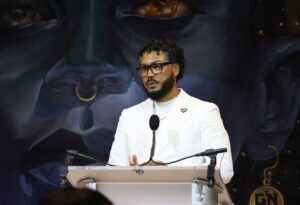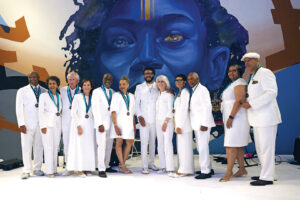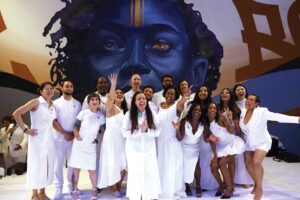Embrace Honors Juneteenth event celebrates Black freedom, culture and leadership
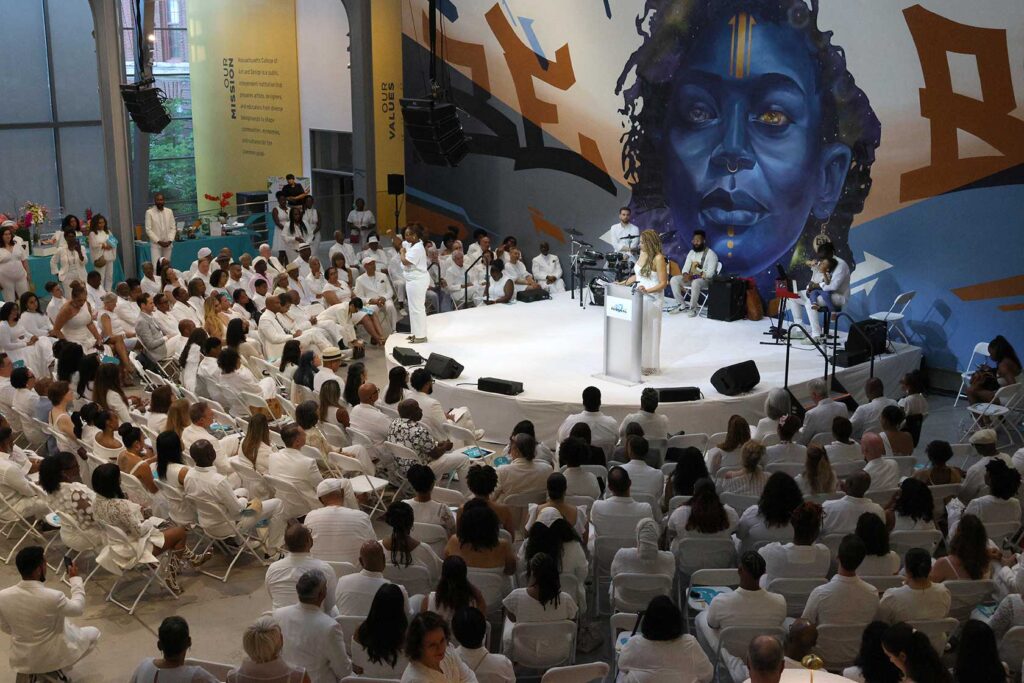
On the night before Juneteenth, hundreds of members of the Black community and their allies commemorated the 72nd wedding anniversary and the civil rights legacy of Dr. Martin Luther King Jr. and Coretta Scott King and honored local leaders committed to building a more racially just and equitable city.
Held at the Massachusetts College of Art and Design in the Fenway, it was a night full of joy along with gospel music, uplifting spirits, and fostering a space of civic engagement and belonging.
Hosted by the nonprofit Embrace Boston, the Embrace Honors Juneteenth event brought together artists, leaders and community members to celebrate Black freedom and culture, and to recognize the continued struggles faced today. The event was part of the multi-day annual Embrace Ideas Festival, which included a panel discussion on Friday, focusing on bringing together local and national leaders to combat racism, and a vision to create an inclusive and equitable Boston by 2030. The aim is to dismantle structural racism by promoting racial equity, healing and well-being through arts, culture and community building.
President and CEO of Embrace Boston, Dr. Imari Paris Jeffries, said it is increasingly important today that people lean toward love and hope to combat the attacks on culture and history, particularly Black American history, currently. He explained that cultural events can provide a powerful medium to spread and preserve lived experiences. “When you think about how events are places for democratic maintenance, social infrastructure and belonging in moments like this, events are one of the few places where placemaking occurs.”
At a time when the Trump administration is making efforts to end programs like diversity, equity and inclusion and to remove Black history instruction in classrooms, the need to continue building communities by creating social infrastructures has become even more urgent to fight back against these initiatives.
“Many of the commitments and promises that our country committed to, we’ve seen a withdrawal, we’ve seen this attack on diversity, equity and inclusion. We see this anti-intellectualism. Every time we see advances in racial equity, we see these backlashes where people want to ‘Make America Great Again,’ ” said Jeffries.
A new report published by Embrace Boston describes how creating cultural spaces and events like these can foster and build social infrastructure in Black communities that are vital to the sense of belonging, Black joy and building social capital. The report emphasizes that these events are a way to provide healing and a vision for a more just society. Ultimately, this fights back against the increasing attacks on diversity, equity and inclusion by centering Black voices and empowerment.
For Dr. Quinton Hurd Sr. and Dr. Takesha M. Hurd, attending Wednesday’s celebration meant more than just connecting with the community; it meant recognition. “A lot of times, the local heroes, the individuals that are in the trenches doing the work, don’t get recognized. At Embrace, they recognize that, and they see value in recognizing its local heroes, so that’s critically important,” said Quinton Hurd.
Such cultural events provide a platform for awareness and reflection, which is essential in addressing the growing backlash fueled by the distorted narrative of race in the United States. This skewed narrative is often used to reinforce the negative connotations of Black history and racial awareness, which becomes weaponized to dismantle the progress in racial justice and inclusion.
“People have misled the word ‘woke’ and now they made ‘wokism’ as a bad thing when woke just means that you read the books, you know the history, you’ve talked to people and know their lived experience. That you’ve had experiences engaging in other cultures and other races. So, this is an opportunity for people to be woke,” said Michael Curry, a vice chair of Embrace Boston.
Understanding the history of discrimination and prejudice against the Black community is essential to fix the damage done by systemic racism. The honorees who were celebrated at Embrace Honors Juneteenth continue their drive to push for change toward racial equity as well as to educate.
“I feel it’s my responsibility as a Black elder to make sure that our young people are knowledgeable of our history. If people are trying to eradicate your history, what you have to do is step up and put yourself in those spaces where you can communicate that history to our young people,” said longtime attorney Joseph D. Feaster Jr., who was honored for his lifelong commitment to forwarding equity, justice and community empowerment.
When teaching and learning about race and Black history are increasingly under attack in many states by threats to funding, it’s crucial to continue to share and discuss history through cultural spaces and social events. It builds
community resistance against policies that aim to erase Black history and culture.
“It’s been a challenging year and all of us need to look to Martin Luther King and Coretta Scott King and the battle that they and others fought for freedom, because today we, too, need to fight for our freedom,” said Carol Fulp, honored for advancing corporate diversity and driving equity in the workplace.
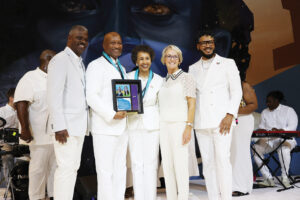
(From left) Embrace co-founder Rev. Jeffrey Brown, honorees Rev. Ray Hammond and Dr. Gloria White-Hammond, Vice Chair Alison Quirk and Embrace Boston CEO Imari Paris Jeffries gather on stage. PHOTO: ZHI ZHU
For Takesha Hurd, Fulp’s book on diversity, equity and inclusion has been transformational and inspirational for her and the people working in the field of DEI. “I salute those women; as an African American woman myself, they have been role models to me here in the city of Boston,” she said.
During one of the seminars on Friday, Massachusetts Senator Liz Miranda and chief of economic opportunity and inclusion for the City of Boston, Segun Idowu, talked about how they are uplifting Black residents in Boston through policy efforts.
Miranda explained how the policy reversals done by the Trump administration has been damaging in the community. “The state has a responsibility and that’s why I pay attention to the $64 billion dollar budget we have, to ensure that money comes to our communities,” she said.
Miranda described how the state must take control when the federal government fails to provide to the people.
“It’s a very scary time for policy makers to legislate from your values, and know that due to the administration, it’s counteracting everything.” One of the policies that Idowu explained was important was on the supplier diversity initiative and how it was something that helps boost Black owned businesses.
“It’s important that we’re growing Black companies, not because it’s socially good or morally appropriate to address past bonds, all of those are important, but it’s economically imperative because when we’re not included in people of color, particularly Black communities and the economy, everyone else loses,” he said.
Trump’s anti-DEI policies threaten the progress already made and compound inequities for Black Americans.
“Racial equity allows us to explore the differences in each other, learn and become more educated about one another, and be better people,” said Fulp.
This movement of events and cultural spaces that Embrace Boston cultivates for the community sends a message to those who are trying to suppress the culture and history of being Black in America. Coming together to learn from one another builds the social infrastructure to fight racial injustice.
“It’s like a spreading of consciousness that more and more people through these events, through relationships, the word will spread, the commitment to justice and culture will spread, that’s really what this is about,” said Curry.
As Trump continues his efforts to reverse DEI initiatives, the work of these individuals and the communities that represent them will continue to fight his policies.
“If people were able to survive the Middle Passage, if people were able to survive slavery and made it to the other side, I think we can survive what’s going on now during the Trump administration and the MAGA beliefs that are taking place,” Feaster said.

